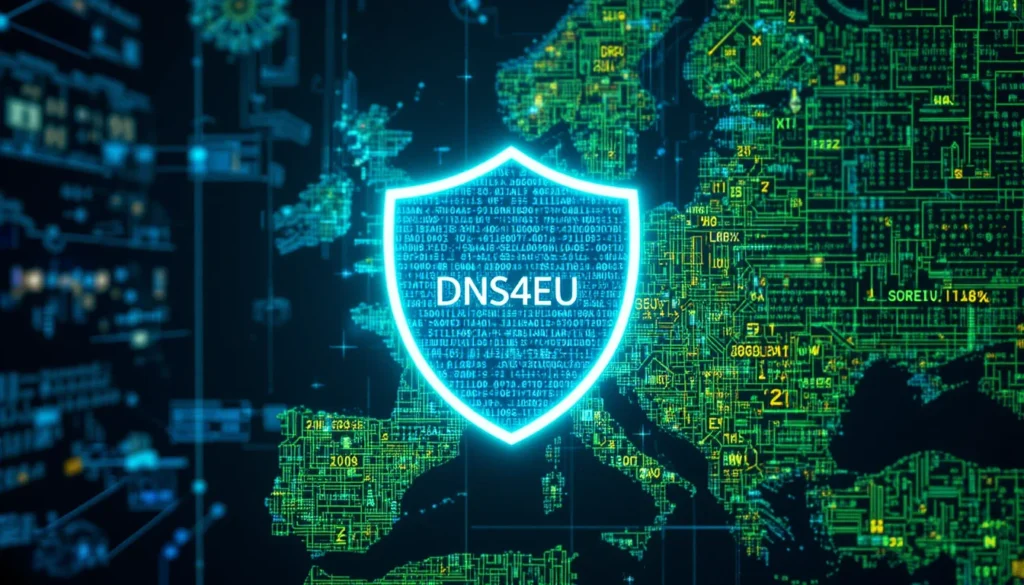Overview
The European Union has officially launched DNS4EU, a powerful new DNS resolution service aimed at enhancing digital sovereignty, privacy, and security across its member states. This initiative represents a significant milestone in Europe’s mission to reduce reliance on foreign infrastructure and deliver secure, privacy-compliant internet services to individuals, companies, and public entities.
Key Facts
- DNS4EU stands for Domain Name System for the European Union.
- It is funded by the Connecting Europe Facility (CEF) and overseen by the European Commission.
- Operated by a consortium including Whalebone, 360NetLab, and CZ.NIC.
- Promises GDPR-compliant DNS resolution, unlike many global providers.
- Designed to be resilient against DNS-based cyberattacks, phishing, and malware domains.
- Currently rolling out across all 27 EU member states, serving institutions, ISPs, and users.
- Public DNS resolvers (e.g., 193.110.157.123) are already accessible.
- Offers a non-logging privacy mode for maximum user anonymity.
What’s Verified and What’s Still Unclear
Verified:
- DNS4EU is operational and supports encrypted protocols like DoH (DNS over HTTPS) and DoT (DNS over TLS).
- Multiple national institutions have started migrating to DNS4EU as their default resolver.
- EU’s goal is to make DNS4EU the preferred DNS for both public and private sectors in Europe.
Unclear:
- How rapidly EU-based ISPs and telecom providers will enforce or adopt DNS4EU.
- Whether DNS4EU will eventually support custom threat intelligence feeds or remain static.
- Full technical transparency regarding data handling and real-time filtering algorithms.
Timeline of Events
- 2021: EU announces its strategic digital decade targets.
- 2022: DNS4EU project selected for funding under CEF Digital.
- Early 2023: Technical pilots begin across select European institutions.
- Mid-2024: Public rollout of DNS4EU begins in stages.
- June 2025: DNS4EU is now accessible and officially promoted EU-wide.
Who’s Behind It?
The core consortium behind DNS4EU includes:
- Whalebone: A European cybersecurity company known for DNS-based filtering.
- CZ.NIC: The Czech domain registry authority.
- 360NetLab: Specialized in large-scale threat intelligence.
The European Commission oversees the initiative, ensuring it aligns with EU law, digital sovereignty, and cybersecurity frameworks.
Public & Industry Response
Reactions are mixed but largely positive:
- Privacy advocates have applauded the move for providing an EU-based, GDPR-aligned alternative to services like Google DNS or Cloudflare.
- Telecom and ISPs are cautiously optimistic but request clear migration strategies.
- Cybersecurity experts praise DNS4EU’s built-in threat filtering but call for more transparency and open-source validation.
- Some skeptics argue it could become a tool for state-level censorship if not handled carefully.
What Makes This Unique?
Unlike commercial DNS providers, DNS4EU is uniquely positioned as:
- Sovereign: Hosted within the EU and subject to European law.
- Private: Offers optional zero-logging modes and encrypted DNS.
- Secure: Preloaded with EU-approved threat feeds to block malware, phishing, and botnets.
- Trusted: Managed by EU-funded and audited cybersecurity organizations.
Understanding the Basics
A Domain Name System (DNS) is the backbone of internet navigation, translating human-friendly URLs into machine-readable IP addresses.
While traditional DNS queries are unencrypted and trackable, DNS4EU uses DoH/DoT encryption, blocks malicious sites, and doesn’t sell user data.
Think of DNS4EU as a privacy-first GPS for your internet traffic, guided by European values of data protection and autonomy.
What Happens Next?
- EU plans to extend DNS4EU coverage by onboarding national governments, universities, and enterprises.
- Public awareness campaigns will encourage individuals to configure DNS4EU on their devices and routers.
- Future upgrades may include child safety filters, IoT-specific security, and integration with EU’s Cybersecurity Certification Framework.
Summary
The launch of DNS4EU marks a bold step in the European Union’s mission to protect its digital infrastructure from surveillance, censorship, and foreign interference. By offering a privacy-respecting, secure, and transparent DNS alternative, the EU is reshaping the way internet navigation works across the continent. As adoption grows, DNS4EU could become a global benchmark for digital sovereignty in DNS resolution.
